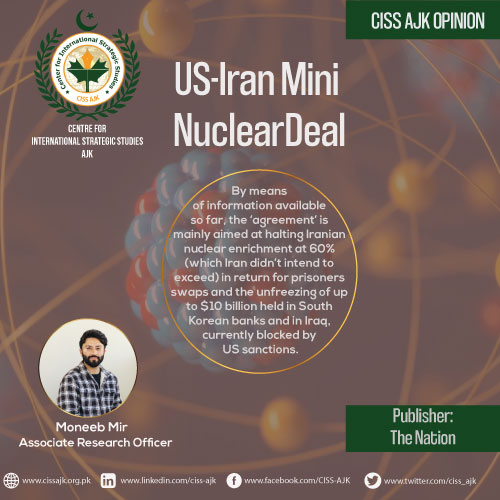695
There has been extensive discussion about the new US-Iran ‘mini agreement’ in the media over the past few weeks. However, with recent confirmed reports that an interim and unwritten nuclear ‘arrangement’ is currently under negotiation. On Thursday, both the countries agreed to what has been termed as the first step in the agreement. According to this, five American captives will ultimately be permitted to depart Iran in return for Tehran obtaining access to $6 billion for humanitarian purposes, and the United States releasing several imprisoned Iranians.
It is important to note that a finalised agreement has not yet been reached. By means of information available so far, the ‘agreement’ is mainly aimed at halting Iranian nuclear enrichment at 60% (which Iran didn’t intend to exceed) in return for prisoners swaps and the unfreezing of up to $10 billion held in South Korean banks and in Iraq, currently blocked by US sanctions. Despite much optimism being attached to the deal, it is engulfed by many uncertainties; nevertheless Iran has more leverage than before.
The agreement, at its core, differs significantly from the JCPOA; its scope is comparatively limited. However, there are numerous doubts surrounding its future, questioning whether an accord will be reached and whether it will prove to be durable. As the details about the ‘deal’ have not yet been fully disclosed by the White House, its officials are observed using terms “mini-agreements” and “interim arrangement” when referring to the deal. Apparently, the Biden Administration is attempting to create a ruse in order to escape the nub of Iran Nuclear Agreement Review Act. Which makes it necessary for the any nuclear with ‘deal’ Iran to go through congressional review, that attenuates the optimism attached with the ‘mini-arrangement’, as the deal can be rejected by the Congress if put before it.
Recently, Representative Michael McCaul, chairman of the House Foreign Affairs Committee, expressed his concerns regarding the ongoing talks by writing a letter to the White House. In his letter, he demanded that the administration submit any arrangement or understanding reached to Congress for review.
What further draws shadows over the deal is the suspension of Robert Mallay, who was the special envoy of the Biden Administration Iran over an investigation into his handling of classified material. Similarly, the US presidential elections are a year away, change of administration in the White House might create a déjà vu situation of the past when American President Donald Trump unilaterally withdrew from the deal. Previously, President Barack Obama JCPOA without involving Congress, such a use of executive power ultimately allowed his successor, Donald Trump, to completely dismantle the deal three years later.
The ‘mini deal’ can also be perceived as a political expedience by the Biden administration, aiming to leverage it for political gain before the next presidential election. The objective would be to freeze the Iranian nuclear program and secure the release of some American citizens from Iranian prisons, thereby capitalising on these achievements. According to Ali Vaez, who is Crisis Group’s Iran Project Director and Senior Adviser to the President, “the Biden administration would like the ‘mini deal’ to be extended to 2025”, till then it might work as confidence building measure and eventually turn into a proper deal like that of JCPOA. However, the deal would remain “at the mercy of a single incident”, according to Ali Vaez. As Israeli Prime Minister’s National Security Advisor Tzachi Hanegbi recently said that “no agreement would obligate Israel” and further remarked “we are preparing for the moment, if it comes, in which we will have to defend the people of Israel against a fanatic regime that is set on annihilating us and is armed with weapons of mass destruction.” It is easy to assess that the role of Israel as a spoiler, which cannot be ruled out. As its one act i.e. to attack an Iranian nuclear facility or an assassination of its nuclear can squander the all progress and bring everything back to ground zero or rather make matters even worse in the West Asia.
The future of any nuclear settlement between Iran and the US or the Western nations, in a broader context, is also contingent on whether European Powers, as signatories to the JCPOA, who have not yet withdrawn from the agreement, decide to lift the missile-related sanctions imposed on Iran. This aspect plays a crucial role in determining the overall success and sustainability of the potential agreement.
The geopolitical landscape in West Asia has experienced recent shifts, with Iran improving its relations with neighboring countries compared to its past. Iran has also been bolstering its ties with China, an ascending global power, which disregards sanctions on Iran and maintains trade relations with the country. In 2021, the two nations solidified a 25-year strategic agreement aimed at enhancing economic and security cooperation.
In these evolving times when NPT regime is crumbling under its own duplicities, and the strategic landscapes are shifting in favor of Iran, the Islamic Republic has gained increased bargaining power when negotiating with the US and Western nations. Nevertheless, the outcome of the negotiations remains intriguing to observe.



